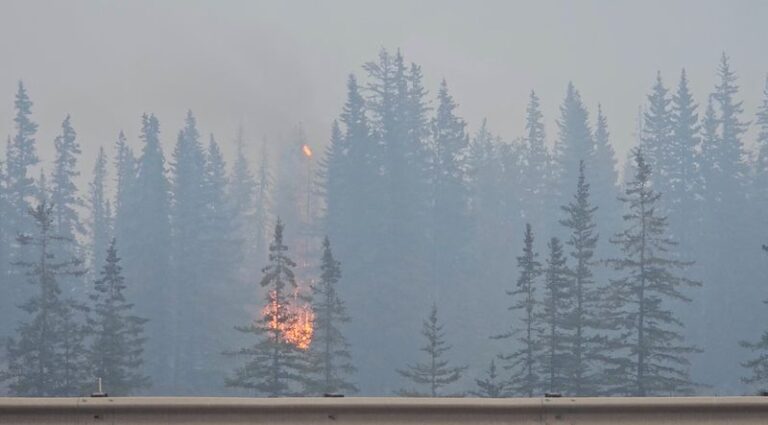By Nia Williams and Anna Mellor Paperny
(Reuters) – A severe wildfire season is taking an increasingly hard toll on Western Canada’s lucrative tourism industry, with some tourists starting to avoid the busy late summer months, worried about out-of-control fires, smoke-filled skies and road closures.
Following a scorching hot start in July, nearly 600 wildfires are now burning across British Columbia and Alberta, including a massive blaze that devastated the picturesque tourist city of Jasper in the Canadian Rockies this week.
Evacuation orders have been issued for dozens of communities, including popular tourist destinations in British Columbia’s Kootenay region, and several highways have been closed.
This year’s surge in wildfires comes after Canada experienced its worst wildfire year on record in 2023, when more than 15 million hectares (37 million acres) burned, including parts of the city of West Kelowna in the heart of British Columbia’s wine region.
Ellen Walker-Matthews, president of the Thompson Okanagan Tourism Association, said the travel industry is seeing more people making last-minute travel decisions instead of booking in advance.
“It’s a big blow. July and August are traditionally the busiest months in this region,” Walker-Matthews said, adding that while her region has been relatively free of wildfire damage this summer, some tourists are choosing to avoid visiting B.C.’s Interior altogether.
Members of the British Columbia Lodging and Campgrounds Association are reporting a five to 15 per cent drop in bookings compared to last year, with the biggest declines in the hotter Okanagan and Cariboo regions, said association president Jos Penny.
“The concern is that this is something we have to accept and it’s now happening every year,” Penny said.
While wildfires in Canada are natural and common, scientists say drier, hotter conditions due to climate change are making the fires more volatile and frequent.
“Smoky Sky”
Events typically held in August, such as the Salmon Arm Roots and Blues Festival, have been postponed to earlier in the summer to avoid what is now considered peak smoke season. The festival, which was cancelled last year due to nearby wildfires, has been moved to July this year to benefit from “less smoky skies.”
Wildfires and extreme weather events are forcing tourists to “alter their travel plans, not just temporarily, but permanently,” said Elizabeth Halpenny, a tourism researcher and professor at the University of Alberta, noting that seasonal workers in the sector are often the hardest hit because they have the least protection during severe weather or major fires.
According to the latest government data, tourism is expected to contribute C$7.2 billion to British Columbia’s economy in 2022 and C$9.9 billion to Alberta’s economy in 2023.
Jasper National Park is one of Canada’s top tourist destinations, attracting more than two million visitors annually to see the pristine mountain scenery and abundant wildlife, including grizzly bears, elk and moose.
Kelly Torrens, vice president of product for international travel company Kensington Tours, said Western Canada is a bucket list destination, but the company has 49 tours scheduled to pass through Jasper this season now up in the air, after six others were forced to evacuate the park when the fires began.
Parks Canada has canceled all camping reservations within Jasper National Park until August 6. As much as 50 per cent of the town’s buildings may have been destroyed in the fire, and cleanup and rebuilding could take years.
Halpenny is among those trying to avoid risk.
“I’ve booked a campground in a mountain park, but I’ve also booked a campground in a grassland somewhere at the same time. That’s my back-up plan because I don’t want to miss a vacation with my family.”
(Reporting by Nia Williams in British Columbia and Anna Mehler-Paperney in Toronto; Editing by Sandra Muller)

